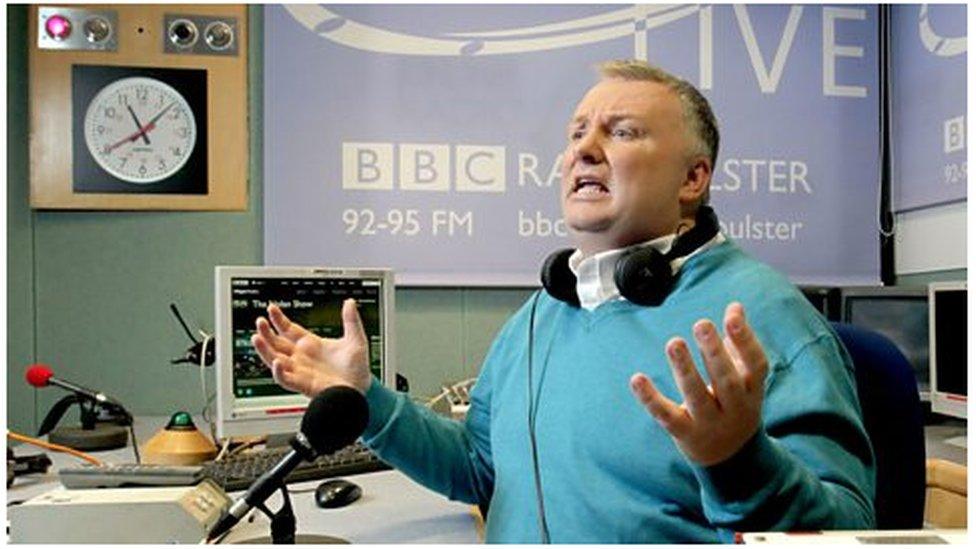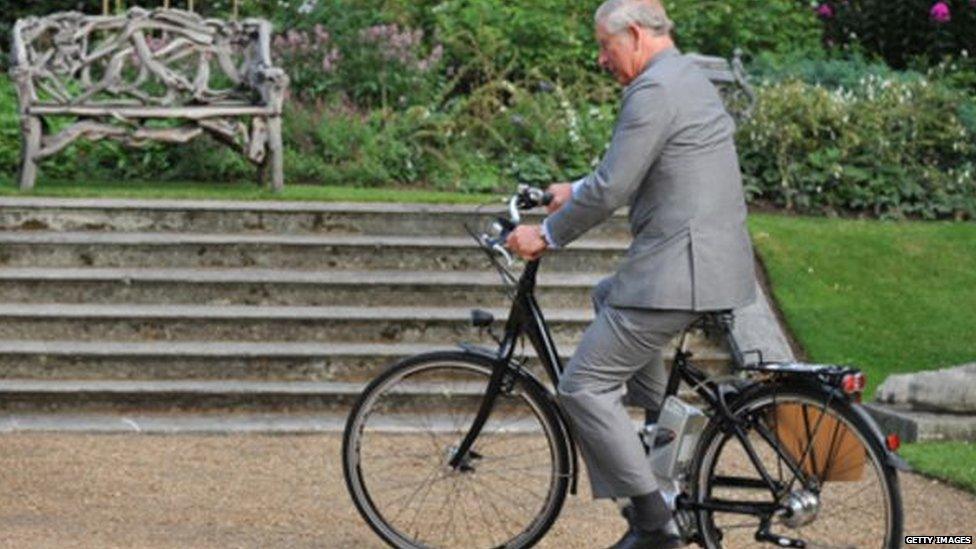Stormont's Catch 22 and eBikes with no batteries
- Published

Stephen Nolan - thankfully not "half broadcaster, half bicycle"
The saga of BBC presenter Stephen Nolan and the eBikes has undeniable comic potential.
As my esteemed colleague considered whether he should get a battery-assisted cycle, the thoughts of Sgt Pluck from Flann O'Brien's Third Policeman, external came into my head.
Just as an e-Bike is in some ways half-vehicle, half-cycle, could Nolan eventually himself become "half-broadcaster, half-bicycle", not heard so much on the airwaves but instead, in the words of Flann, spending "a lot of his time leaning with one elbow on walls, or standing propped by one foot at kerbstones"?
Now, though, the appropriate literary allusion has changed to another masterpiece which, like The Third Policeman, is only half comic.
Joseph Heller's famous Catch 22, external dictated that Captain John Yossarian could not get out of flying for the US Air Force during World War Two on grounds of insanity.
Catch 22 stipulated that if he applied for a dispensation it showed he must have a sane regard for his own safety, so could not be mentally ill.
Stormont stand-off
Nolan's investigations into the regulations regarding eBikes in Northern Ireland revealed that the legislation covering them was never updated in line with the rest of the UK, and the Stormont stand-off is making it impossible to rectify the regulations.
Catch 22 applies because eBike riders are being told they must register, licence and MOT their vehicles.
However, the Nolan Show revealed that this is simply impossible, and officials are aware of the "double bind".
A caller said staff at a local MOT centre had started laughing when he had enquired about getting his eBike tested.
The absurdity of the situation is underlined by the latest guidance from the cycle retailers Halfords telling eBike owners they might have to disconnect their batteries to use their machines legally on Northern Ireland's roads.
The problem of local regulations lagging behind laws elsewhere in the UK predates devolution - way back in the early 1990s I was reporting on the deficiencies of the Order in Council system that operated under direct rule.

eBiking at a royal residence - no licence required
Indeed, it seems the roots of the eBike debacle may go back that far.
Once devolution was in place, there should have been the potential for a small jurisdiction like Northern Ireland to become a fast-responding legislative laboratory, pioneering innovative approaches to problems.
However, the administrative and party political drag in the system all too often meant we continued to move at a glacial pace.
The adoption of commonsense regulations from elsewhere in the UK, as in the eBike saga, should surely operate on a much quicker default basis than is currently the case.
Now the wider Stormont Catch 22 is holding up not just eBike regulation, but compensation for victims of historic abuse in children's homes, changes to the law on domestic violence, and any formal executive input to the Brexit debate.
Items in abeyance
Also being held up are consideration of a working group's report on the sensitive issue of fatal foetal abnormality, the future of outdoor education centres, nursery hours for children with special educational needs - the list of items in abeyance goes on.
The rest of the UK thinks we are living off the largesse of the DUP's £1bn package. However, even that cannot be distributed while the current Catch 22, regarding rule by civil servants versus full-blown direct rule, remains unresolved.
This helps explain why the impact of the latest tranche of money for the health service is so limited.
When party negotiators return at the end of the month. will they steer a way through these multiple chicanes?
Or will they stall once again, like eBike riders with no batteries? Is it about good government or, to quote Flann O'Brien again, "is it about a bicycle?"